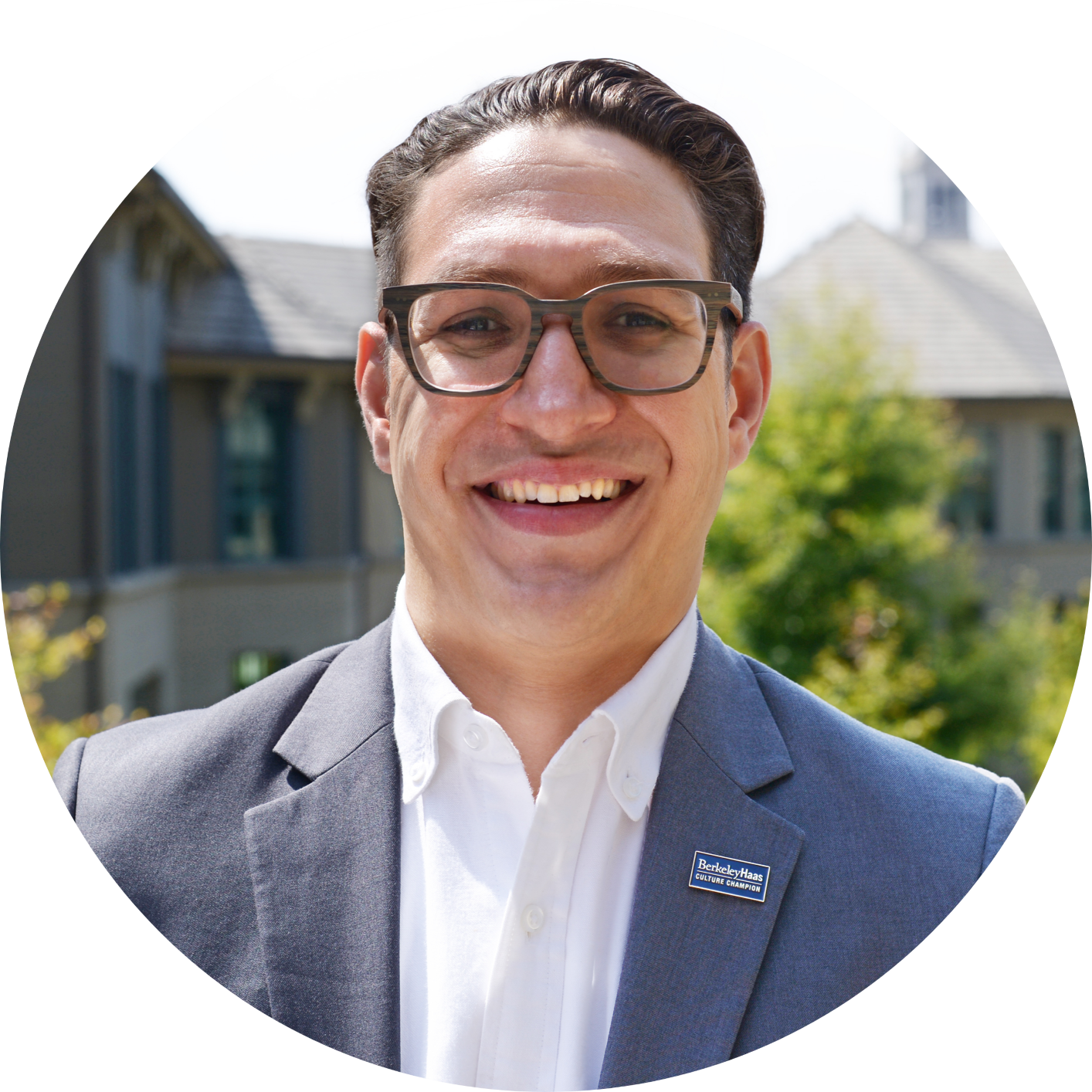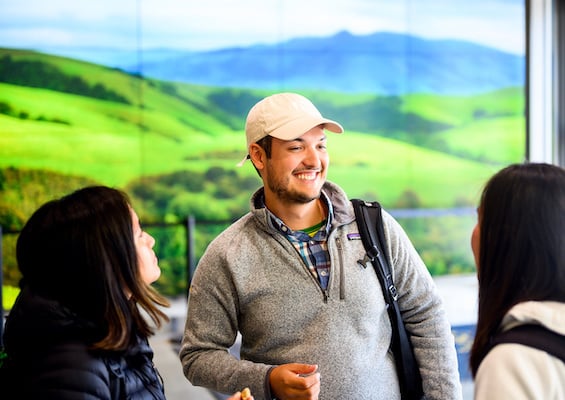It’s important to know what skills will keep you on the cutting edge of your industry. Here’s how Berkeley Haas MBA alumni have made an impact.
Keeping up with near constant change in the job market can be intimidating. You need the training, network, and resources to stay ahead, especially if you’re looking to get to the next level in your career. Sometimes you might not even know what direction to pursue when you want doors to open.
The University of California, Berkeley Haas School of Business’ highly ranked MBA programs has turned out thousands of innovators and world changers. From technology, to biotech, to energy, and even the ever-changing political landscape, our alumni have shown that they can make a difference. The value they’ve created for themselves and especially for others has changed lives.
Innovation is a part of the culture at Haas. The options offered within the MBA curriculum have provided diverse opportunities for students. “Today we take innovation for granted but Haas really was a pioneer,” says Gary Pisano, PhD 88.
The value they’ve created for themselves and especially for others has changed lives."
The current Harvard professor says that academics are taking note of what’s being done at Berkeley, “Haas started to become an intellectual hub on the serious work of innovation management and strategy—an influence not just in the form of papers but also PhD students who went off to teach at various business schools nationwide.”
Innovators in healthcare and biotech
When a school is being cited by professors at other universities for the impact they’re making on the world of business, people interested in careers focused on innovation pay attention. Lauren Dugard Thomas, MBA/MPH 17 is a healthcare strategist who started her career as an engineer. Her background working with medical devices led her to the business side and eventually to Haas, “I was focused on healthcare, so I always got to look at it through the lens of healthcare,” she says.
The world of biotech is full of innovations thanks to research and development of new drugs and therapies. Approximately 7.5% of the Full Time MBA class of 2023 got jobs in the healthcare industry. The program has honed in on them through a concurrent MBA/MPH career path that gives students a comprehensive curriculum and experiential learning opportunities.
“We were always problem solving through that healthcare lens. So I was always able to have those very real, tangible examples,” Lauren said about her experience at Haas. She has carried the idea of using that lens into her career, where she works as a consultant, identifying and solving problems within the healthcare industry. Her main focus is making sure that underserved populations are considered in the solutions.
One major problem in need of a solution is the cost of healthcare. Health insurance can be a driving factor for whether or not people seek medical treatment. 60% of women in the US are uninsured, underinsured, or on Medicaid. Access to birth control can be an issue for them. Sometimes even taking time off of work to see a doctor can be a struggle. Amy Fan, MBA/MPH 19, saw this problem as an opportunity for innovation.
Amy co-founded Twentyeight Health to give women convenient access to reproductive services. The company offers women online access to a board-certified physician who can provide a prescription for birth control. Uninsured women may qualify for a year’s worth of free birth control while those with insurance can get it at an extremely low cost.
“So much of healthcare is focused on people with a high ability to pay,” says Amy. “For low-income patients, and for women of color especially, we put so many burdens on them without trying to understand how we can make it easier for them to access healthcare.”
Access to mental health care has also gone online, but the process that medical providers use with patients can be somewhat routine. Brad Kittredge, MBA/MPH 09, felt that many providers see treatment for mental health as one-size fits all, “Our healthcare system has been treating depression or anxiety as one thing when in fact they’re complex, heterogeneous conditions,” he says. “And the reality is that the traditional care model hasn’t gotten good outcomes that way.”
Brad is a co-founder of Brightside Health, a company which provides evidence-based and personalized online therapy and medication management from licensed practitioners. Their approach uses data points from patients to help doctors get the information they need to prescribe the best treatment. This targeted approach has shown that patients have an 80% success rate when compared to traditional treatment with its 52% success rate.
Substance abuse is another very individualized healthcare issue and relapses are common. People who fail sometimes just disappear, which makes it hard for medical professionals to provide the care they need to get them back on track. Rebecca Messing Haigler, MBA/MPH 09, has been working to change that by helping to design technology that provides real-world data on people who want to be treated for substance abuse.
This technology is able to pull data from government programs, family surveys, employer updates, mobile apps or devices and whatever resources are available in order to help track someone down to check up on them. Rebecca says that the technology is a follow up tactic that could lead to improvements in treatment, “When patients fall off the radar, we can find out what happened from families or the community or if they showed up for work from employers.”
Energy & Cleantech leaders
Innovations in individualized healthcare are big, but some Haas grads wanted to make their impact on the entire planet. The Energy & Cleantech career path gives students hands-on experience by combining business, engineering, bioscience, law, and public policy.
Michele de Nevers is the recently retired Managing Director of the Office of Sustainability and Climate Change at UC Berkeley. She works with faculty to promote the idea of sustainability to future business leaders, “We want every Haas graduate to have an understanding of the key issues, challenges, and framing of sustainability,” she says.
Kyle Bertin, MBA 18, foresaw some of the changes that were happening with technology in the transportation and logistics industry. Haas was the perfect place for him to explore these changes and find solutions to problems, “Through the Berkeley energy and resources collaborative, having the opportunity to work on projects where I was leading a team of PhDs and Masters students from the engineering college, the material science college, the the physics department and really being able to leverage the value of their knowledge and capability and bring that to bear on a highly technical project.”
In 2022 Kyle combined his expertise in logistics and sustainability to co-found Two Boxes, a company that partners with third party logistics customers to streamline the return process. With the increase of people partaking in online shopping, the transportation and logistics industry put out a lot of emissions that have a negative impact on the environment. Two Boxes has developed ways to make returns more efficient and eco-friendly.
Decarbonization is the goal behind QuantumScape, an innovative company co-founded by Jagdeep Singh, MBA 90. QuantumScape has created fast charging, long lasting, and safer battery cells to power zero-emissions vehicles.
“Since our founding, QuantumScape’s been on a mission to make a positive impact on the environment by helping to meaningfully reduce global greenhouse gas emissions from the transportation sector,” he says.
According to Edmunds, only 6.8% of the vehicles on the road in the US are EVs. Jagdeep says that change isn’t going to happen until there’s a reason for people to give up their combustion engines, “You can’t mandate your way to getting people to drive cleaner cars,” he says. “You have to have products that people want to buy.”
Diversity within finance
QuantumScape has recently penned a deal with PowerCo, owned by Volkswagen Group, to produce the battery cells. Large companies and venture capitalists see potential in some of the clean energy innovations by smaller startups. Haas MBA students can learn about socially responsible financial opportunities in real time through the Sustainable Investment Fund.
Jake Wamala, MBA 19, understood the importance of sustainability during his time as a student. He got more hands-on experience during his internship, “I had the opportunity to work at Parnassus Investments in San Francisco, which is a long only socially responsible investment fund, based downtown. It’s founded by Berkeley alumni, Jerry Dodson, who’s one of the founders of socially responsible investing. “
Jake is currently a Global Research Analyst at Aristotle Capital Management, LLC in Los Angeles. He has stayed involved with the Toigo Foundation, an organization for MBA students that promotes diversity within the finance industry. Jake has shown his enthusiasm for getting more people of color involved in investment management by serving on committees and panels.
Christina Ma, MBA 01, is forging a path for females in finance in Asia. She serves as the Head of Global Banking, Asia-Pacific, for HSBC. According to Deloitte, only 14% of women hold top level management roles in Asia. Christina is glad to see that there has been a push for diversity and inclusion at all levels.
“I think there’s a realization that this is a much longer role,” she says. “I hope that I have shown other women and men that you can succeed while being different from others and that the diversity of thought and style is valued and a good commercial decision.”
Christina is one of many Haas trained finance execs working in Asia. Alumni are making their mark all over the continent. Moses Lo, MBA 15, is a cofounder of Xendit, a payment gateway for Indonesia, the Philippines, and Southeast Asia. Moses is from Indonesia and saw an opportunity to breathe new life into the country’s economy, “We have the opportunity to build new digital infrastructure that will empower the next generation of businesses in Southeast Asia.”
Moses credits people and cultural understanding with the reason Xendit is seeing so much growth and success, “It’s all about relationships,” he says. “You need to understand the powers that be and how to get regulators to work with you."
The business of politics
Connecting with the powers that be can sometimes lead business professionals in a new career direction. Haas MBA alumni are sprinkled all over in the world of politics. One of them is Eleni Kounalakis, MBA 92, California’s Lieutenant Governor and a candidate for Governor in 2026. After spending 18 years working for her family’s business, she made public service a priority and hasn’t looked back, “There may come a time,” she says, “after you’ve accomplished certain things when you take a pause and ask, ‘Now, what will be meaningful to me?’ And at that point, mid-career or toward the end of your career, getting into service is a great option.”
Another MBA-turned-politician is Donna Colson, MBA 94. She has served on the city council and is now the mayor of Burlingame, California. As a politician, her background in business has been invaluable, “The ability to run through financial statements and read a balance sheet, to develop a budget, and to understand how pension funds work—just understanding the mechanics behind economic development, macroeconomics, microeconomics, accounting, and finance—these are things I use every day,” says Donna.
Being at the forefront of a community does take more than just business and people skills. There are decision making processes and the ability to see the big picture that can make or break a politician. The Social Impact career path at Berkeley is one way for an MBA student with political aspirations to start thinking like a politician.
The former vice-mayor of San Jose, Charles “Chappie” Jones, MBA 90, says that these skills are essential, “In the private sector, the goal is to either get market share or to make a profit and grow. But in the public sector, it’s all about delivering services to your community.”
Leadership in today's world
Haas MBA alumni are a diverse group who have a wide range of interests that have led to some unique career paths. They are trained as leaders and encouraged to pursue their passions in order to make an impact on the world in their own way. Countless experiences have shown that our alumni are making a difference in the world from healthcare, to technology, to government.









